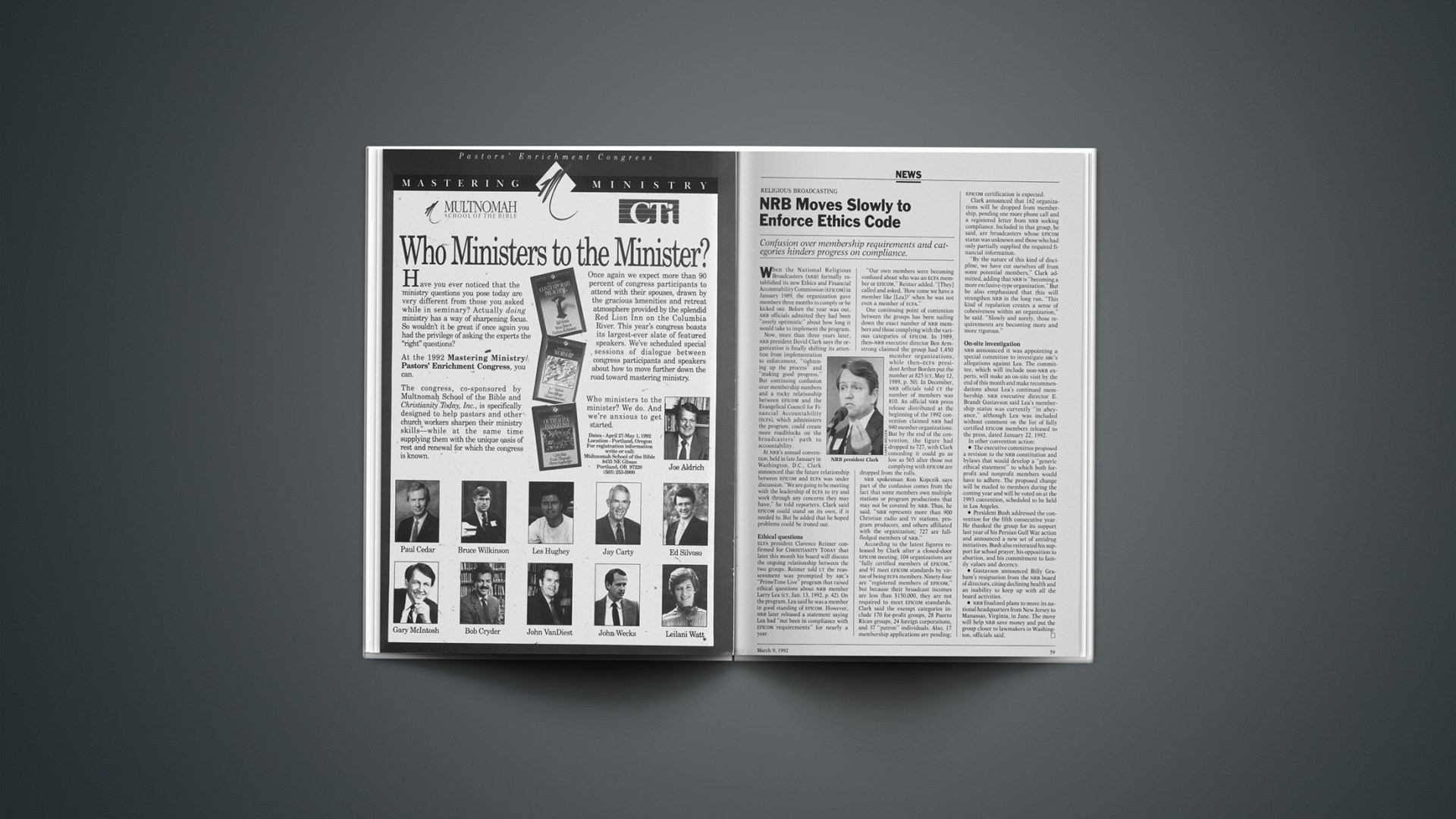Confusion over membership requirements and categories hinders progress on compliance
When the National Religious Broadcasters (NRB) formally established its new Ethics and Financial Accountability Commission (EFICOM) in January 1989, the organization gave members three months to comply or be kicked out. Before the year was out, NRB officials admitted they had been “overly optimistic” about how long it would take to implement the program.
Now, more than three years later, NRB president David Clark says the organization is finally shifting its attention from implementation to enforcement, “tightening up the process” and “making good progress.” But continuing confusion over membership numbers and a rocky relationship between EFICOM and the Evangelical Council for Financial Accountability (ECFA), which administers the program, could create more roadblocks on the broadcasters’ path to accountability.
At NRB’s annual convention, held in late January in Washington, D.C., Clark announced that the future relationship between EFICOM and ECFA was under discussion. “We are going to be meeting with the leadership of ECFA to try and work through any concerns they may have,” he told reporters. Clark said EFICOM could stand on its own, if it needed to. But he added that he hoped problems could be ironed out.
Ethical Questions
ECFA president Clarence Reimer confirmed for CHRISTIANITY TODAY that later this month his board will discuss the ongoing relationship between the two groups. Reimer told CT the reassessment was prompted by ABC’s “PrimeTime Live” program that raised ethical questions about NRB member Larry Lea (CT, Jan. 13, 1992, p. 42). On the program, Lea said he was a member in good standing of EFICOM. However, NRB later released a statement saying Lea had “not been in compliance with EFICOM requirements” for nearly a year.
“Our own members were becoming confused about who was an ECFA member or EFICOM,” Reimer added. “[They] called and asked, ‘How come we have a member like [Lea]?’ when he was not even a member of ECFA.”
One continuing point of contention between the groups has been nailing down the exact number of NRB members and those complying with the various categories of EFICOM. In 1989, then-NRB executive director Ben Armstrong claimed the group had 1,450 member organizations, while then-ECFA president Arthur Borden put the number at 825 (CT, May 12, 1989, p. 50). In December, NRB officials told CT the number of members was 810. An official NRB press release distributed at the beginning of the 1992 convention claimed NRB had 940 member organizations But by the end of the convention, the figure had dropped to 727, with Clark conceding it could go as low as 565 after those not complying with EFICOM are dropped from the rolls.
NRB spokesman Ron Kopczik says part of the confusion comes from the fact that some members own multiple stations or program productions that may not be covered by NRB. Thus, he said, “NRBrepresents more than 900 Christian radio and TV stations, program producers, and others affiliated with the organization; 727 are full-fledged members of NRB.”
According to the latest figures released by Clark after a closed-door EFICOM meeting, 104 organizations are “fully certified members of EFICOM,” and 91 meet EFICOM standards by virtue of being ECFA members. Ninety-four are “registered members of EFICOM,” but because their broadcast incomes are less than $150,000, they are not required to meet EFICOM standards. Clark said the exempt categories include 170 for-profit groups, 28 Puerto Rican groups, 24 foreign corporations, and 37 “patron” individuals. Also, 17 membership applications are pending; EFICOM certification is expected.
Clark announced that 162 organizations will be dropped from membership, pending one more phone call and a registered letter from NRB seeking compliance. Included in that group, he said, are broadcasters whose EFICOM status was unknown and those who had only partially supplied the required financial information.
“By the nature of this kind of discipline, we have cut ourselves off from some potential members,” Clark admitted, adding that NRB is “becoming a more exclusive-type organization.” But he also emphasized that this will strengthen NRB in the long run. “This kind of regulation creates a sense of cohesiveness within an organization,” he said. “Slowly and surely, those requirements are becoming more and more rigorous.”
On-Site Investigation
NRB announced it was appointing a special committee to investigate ABC’s allegations against Lea. The committee, which will include non-NRB experts, will make an on-site visit by the end of this month and make recommendations about Lea’s continued membership. NRB executive director E. Brandt Gustavson said Lea’s membership status was currently “in abeyance,” although Lea was included without comment on the list of fully certified EFICOM members released to the press, dated January 22, 1992.
In other convention action:
• The executive committee proposed a revision to the NRB constitution and bylaws that would develop a “generic ethical statement” to which both for-profit and nonprofit members would have to adhere. The proposed change will be mailed to members during the coming year and will be voted on at the 1993 convention, scheduled to be held in Los Angeles.
• President Bush addressed the convention for the fifth consecutive year. He thanked the group for its support last year of his Persian Gulf War action and announced a new set of antidrug initiatives. Bush also reiterated his support for school prayer, his opposition to abortion, and his commitment to family values and decency.
• Gustavson announced Billy Graham’s resignation from the NRB board of directors, citing declining health and an inability to keep up with all the board activities.
• NRB finalized plans to move its national headquarters from New Jersey to Manassas, Virginia, in June. The move will help NRB save money and put the group closer to lawmakers in Washington, officials said.










